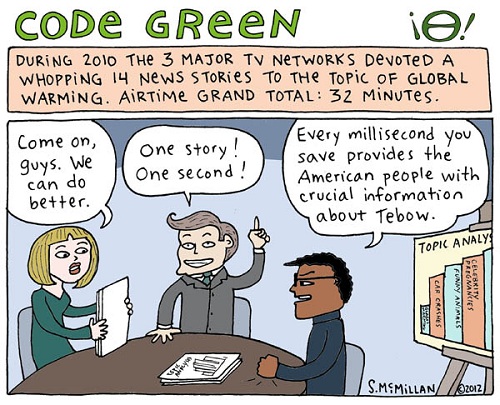2012 SkS Weekly Digest #15
Posted on 16 April 2012 by John Hartz
SkS Highlights
Dana's NASA Climate 'Skeptics' Respond with Science! Just Kidding, drew considerable attention from SkS readersand was reprinted by the UK's The Guardian. It was also reposted and referenced on a number of other prominent websites. [See the SkS in the News section of this digest for more details and links.]
Dana's Shakun et al. Clarify the CO2-Temperature Lag has generated over 100 comments since it was posted thereby setting a record for the year to date. Linking Weird Weather to Rapid Warming of the Arctic by Daniel Bailey is a repost from Yale 360.
Toon of the Week

32 Minutes
Source: Code Green, a weekly editorial cartoon focused on the environmental emergency, by Stephanie McMillan.
Quote of the week
"NASA sponsors research into many areas of cutting-edge scientific inquiry, including the relationship between carbon dioxide and climate. As an agency, NASA does not draw conclusions and issue 'claims' about research findings. We support open scientific inquiry and discussion.
"Our Earth science programs provide many unique space-based observations and research capabilities to the scientific community to inform investigations into climate change, and many NASA scientists are actively involved in these investigations, bringing their expertise to bear on the interpretation of this information. We encourage our scientists to subject these results and interpretations to scrutiny by the scientific community through the peer-review process. After these studies have met the appropriate standards of scientific peer-review, we strongly encourage scientists to communicate these results to the public.
"If the authors of this letter disagree with specific scientific conclusions made public by NASA scientists, we encourage them to join the debate in the scientific literature or public forums rather than restrict any discourse."
Response from NASA Chief Scientist Waleed Abdalati to Letter on NASA Climate Studies. Abdalati's response was posted on SpaceRef, April 12, 2012.
Issue of the Week
Based on your personal experience, what is the most difficult aspect of manmade climate change to explain to the average person? From your perspective, has SkS adequately addressed this particular issue?
Word of the Week: Ecocide
eco•o•cide noun: the extensive damage to or loss of ecosystem(s) of a given territory, whether by human agency or by other causes, to such an extent that the peaceful enjoyment by the inhabitants of that territory has been severely diminished.
Source: Eradicating Ecocide in Canada
The Week in Review
A complete listing of the articles posted on SkS during the past week.
- Which plants will survive droughts, climate change? by John Hartz
- Global Warming in a Nutshell by Larry M
- Why David Archibald is wrong about solar cycles driving sea levels (Part 1B) by Alex C
- Linking Weird Weather to Rapid Warming of the Arctic by Daniel Bailey
- NASA Climate 'Skeptics' Respond with Science! Just Kidding. by Dana
- Data Contradicts Connection Between Earth's Tilt and the Seasons by ptbrown31
- New research from last week 14/2012 by Ari Jokimäki
- DeConto et al: Thawing permafrost drove the PETM extreme heat event by Andy S
- Shakun et al. Clarify the CO2-Temperature Lag by Dana
Coming Soon
A list of articles that are in the SkS pipeline. Most of these articles, but not necessarily all, will be posted during the week.
- Cliff Ollier: Swimming In A Sea of Misinformation (Rob Painting)
- New research from last week 15/2012 (Ari Jokimäki)
- Global Surface Warming Since 1995 (Dana)
- GISTEMP: Cool or Uncool? (Kevin C)
- Global Warming Causing Heat Fatalities (Dana)
- Two Centuries of Climate Science: a potted history (John Mason)
- Why Are We Sure We're Right? #1 (Rob Honeycutt, Dikran Marsupial, Glenn Tramblyn, Ari Jokimäki)
- Climate Change Boosts Then Quickly Stunts Plants, Decade-long Study Shows (John Hartz)
SkS in the News
Dana's NASA Climate 'Skeptics' Respond with Science! Just Kidding, was re-posted by The Guardian and Climate Progress, and referenced and cribbed by The Huffington Post.
Simple Myth Debunking of the Week
Climate's changed before, you say? Certainly it has, but those changes must have a cause. All long-term climate changes are caused by a global energy imbalance, and right now that energy imbalance is being caused by humans increasing the greenhouse effect.
SkS Spotlights:
The Center for Climate and Energy Solutions (C2ES) is an independent, nonpartisan, nonprofit organization working to advance strong policy and action to address the twin challenges of energy and climate change.
Launched in November 2011, C2ES is the successor to the Pew Center on Global Climate Change, long recognized in the United States and abroad as an influential and pragmatic voice on climate issues. The Pew Center’s founder, Eileen Claussen, and its senior team continue to lead the effort.
At C2ES, we believe that ensuring safe, reliable, affordable energy for all – while protecting the global climate – is a paramount challenge of the 21st century. We see signs of progress around the world. But far greater effort is needed if we are to keep these challenges from becoming true crises. Now more than ever, we need committed voices with the expertise to cut through complexity and craft innovative solutions; the independence to separate fact from fiction; and the credibility to work with all sides to build common ground.































 Arguments
Arguments























 0
0  0
0






Comments